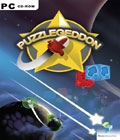Genre: Puzzle
Publisher: Pieces Interactive
Developer: Pieces Interactive
Release Date: November 27, 2008
For every great success, there will be many imitators. Some of these imitators will take the idea and try to add their own flair to it, and some will succeed, while others will fall far short. Multiplatform classic Puzzle Quest: Challenge of the Warlords, with its damage-based puzzle system, now enjoying its sequel in the sci-fi based Puzzle Quest: Galactrix, has something of an imitator in Puzzlegeddon. Unfortunately, the biggest differences between the two titles may get in the way of Puzzlegeddon being optimally enjoyed. Pieces Interactive has added a fun twist to a familiar premise, but Puzzlegeddon doesn't quite offer enough distinctness and fun to justify the modest $15 price tag.
The basic premise of Puzzlegeddon is that it's basically a real-time variant of Puzzle Quest. Break tiles of a color to generate resources, which you then use to attack your foes or protect yourself, in 12 different fashions. The game's puzzle, rather than being a Bejeweled derivative, involves you rotating rows and columns of a six-by-six grid to get groups of five or more blocks of the same color together, which are then turned into resources. The fact that each player has his own board, and thus can operate in real time, produces a modestly frenetic pace, rather than the thinking tone of the Puzzle Quest series. Otherwise, the gameplay is the same: generate resources for effects and use them.
Other than the basics in gameplay differentiation, there is almost nothing to Puzzlegeddon, for the other way it makes itself distinct is by tearing out most all of the gameplay. There are no RPG elements, and there's no need to build characters with attack and equipment lists tuned to you. All that the game offers are two types of multiplayer matches and one solo play mode, which is really just one element of the multiplayer matches turned into a full mode.
In a match of up to six players (including three difficulties of bots), you can compete by getting the highest kill count or being the last player standing. You do this with the same resources as every other player, modified only by the selection of one modestly anthromorphized building, each offering a slight thematic boost with which to face your opponents. With three standard attacks, defenses, self-buffs, and debuffs, the only distinct-feeling element is the way the game handles players dying. Rather than simply respawning with some penalty upon dying, you either solve more of the exact same color play with a dingy and very brown graveyard theme instead of bright colors to come back to life, or, in "last man standing" mode, follow objectives in the same theme to gain an advantage in the next round, in the form of a limited supply of starting resources.
The game's single-player mode has you racing against a clock to complete objectives in the graveyard theme, which is the mode you play if you're killed in the last-man-standing mode. A clock is the timer now, instead of the other players. In other words, the single-player mode is just one aspect of the multiplayer, a fact that rapidly becomes quite boring.
Graphically, Puzzlegeddon is simplistic, expressive and smooth. Missiles are short, stubby things with basic explosion effects, shields and tricks are stereotypical green circles, and while the bots are different football helmets with arms and legs, the six playable character types are all buildings with ever-so-slight and cute emotional traits. The play fields consist of generic colored blocks, against the backdrop of a globe, with up to six competitors standing on islands around the place. The sound consists of some rather generic music, and some very indicative sound effects that help establish the game's pace and may be vital clue-ins to attacks that come at you.
Puzzlegeddon is a twist or three on a familiar concept, and it tries to make a party game out of a premise that's perhaps not so well-suited to it. At the current price point, it's hard to justify a game that is ultimately so simple and small, even if it can be fairly enjoyable. Pieces Interactive has a good premise here, but ultimately, they didn't make enough out of it to justify the cost.
Score: 6.5/10
More articles about Puzzlegeddon













 Puzzlegeddon features a clever mix of puzzle, action and strategy. Select your island of choice and puzzle for resources to defend yourself and to defeat opponents throughout the many galaxies, game modes and challenges in the world of Puzzlegeddon.
Puzzlegeddon features a clever mix of puzzle, action and strategy. Select your island of choice and puzzle for resources to defend yourself and to defeat opponents throughout the many galaxies, game modes and challenges in the world of Puzzlegeddon.














